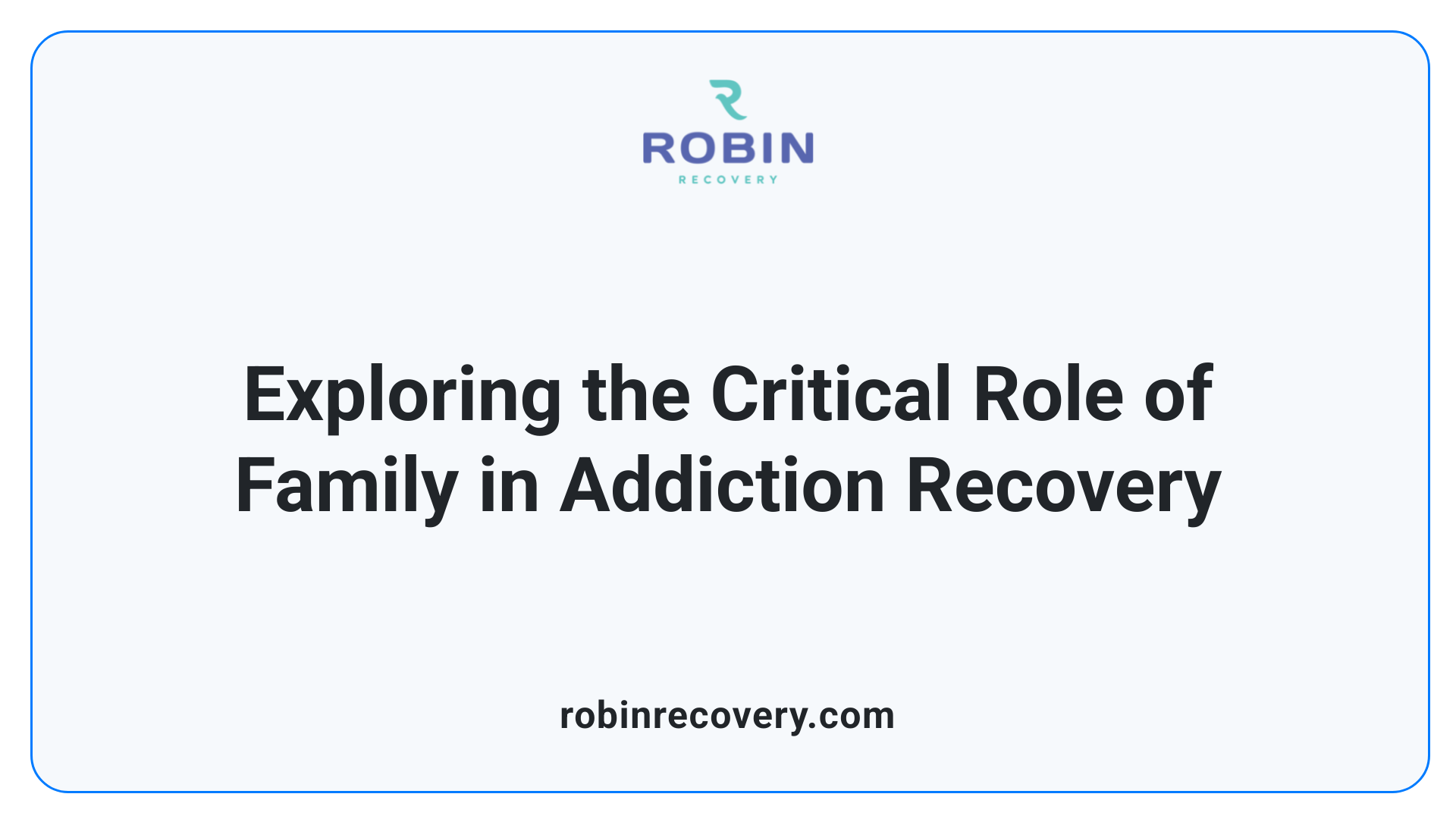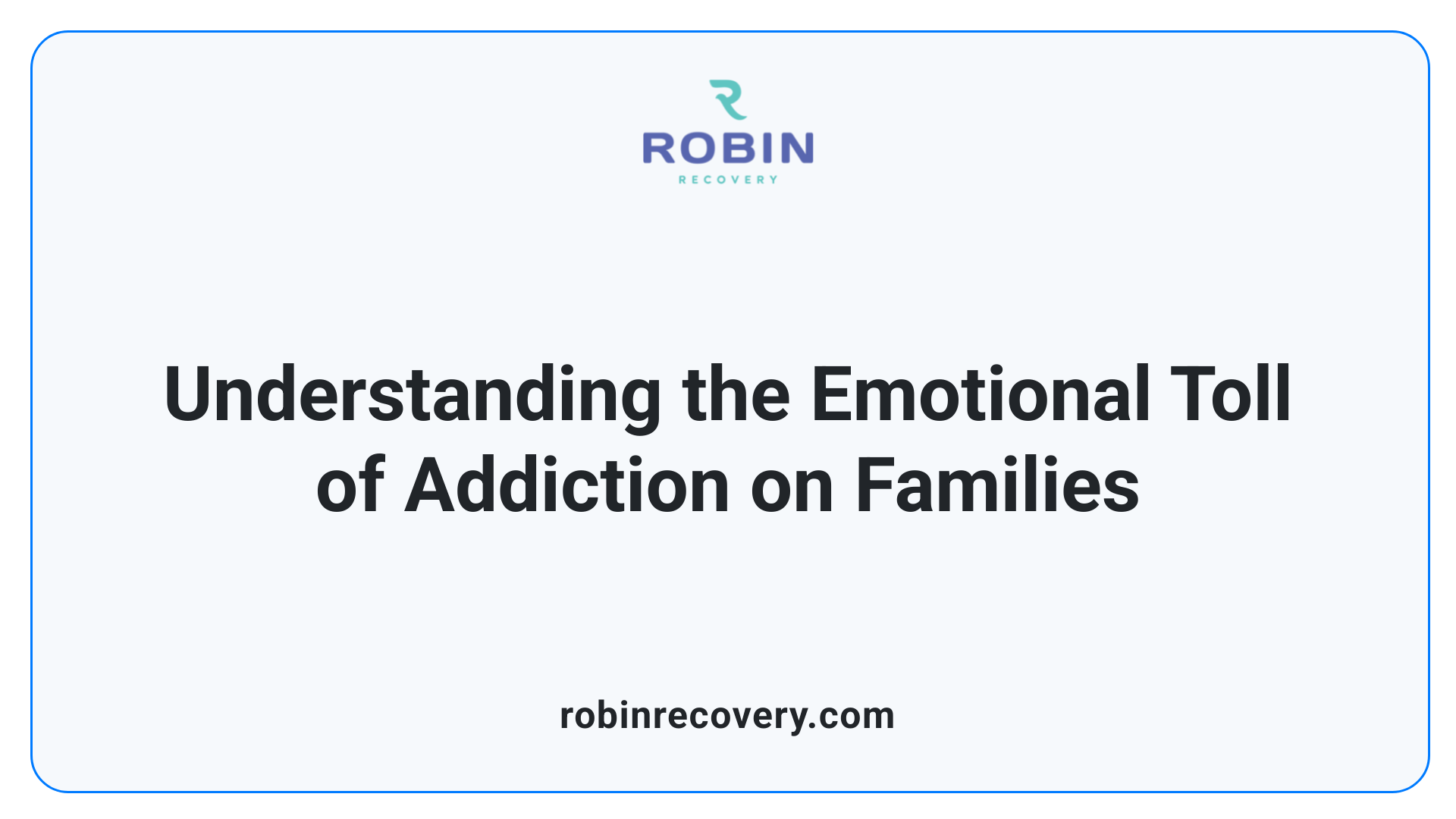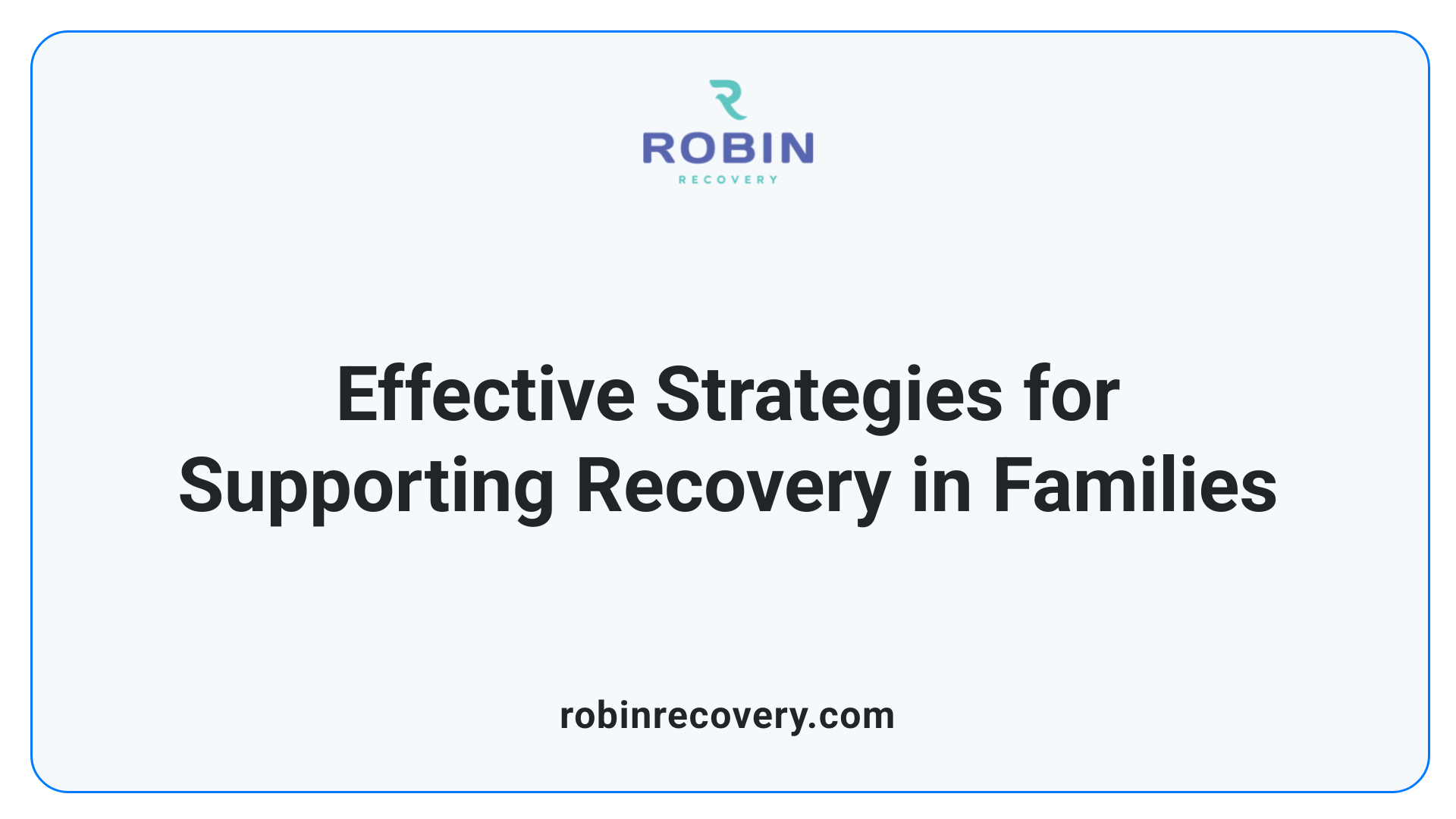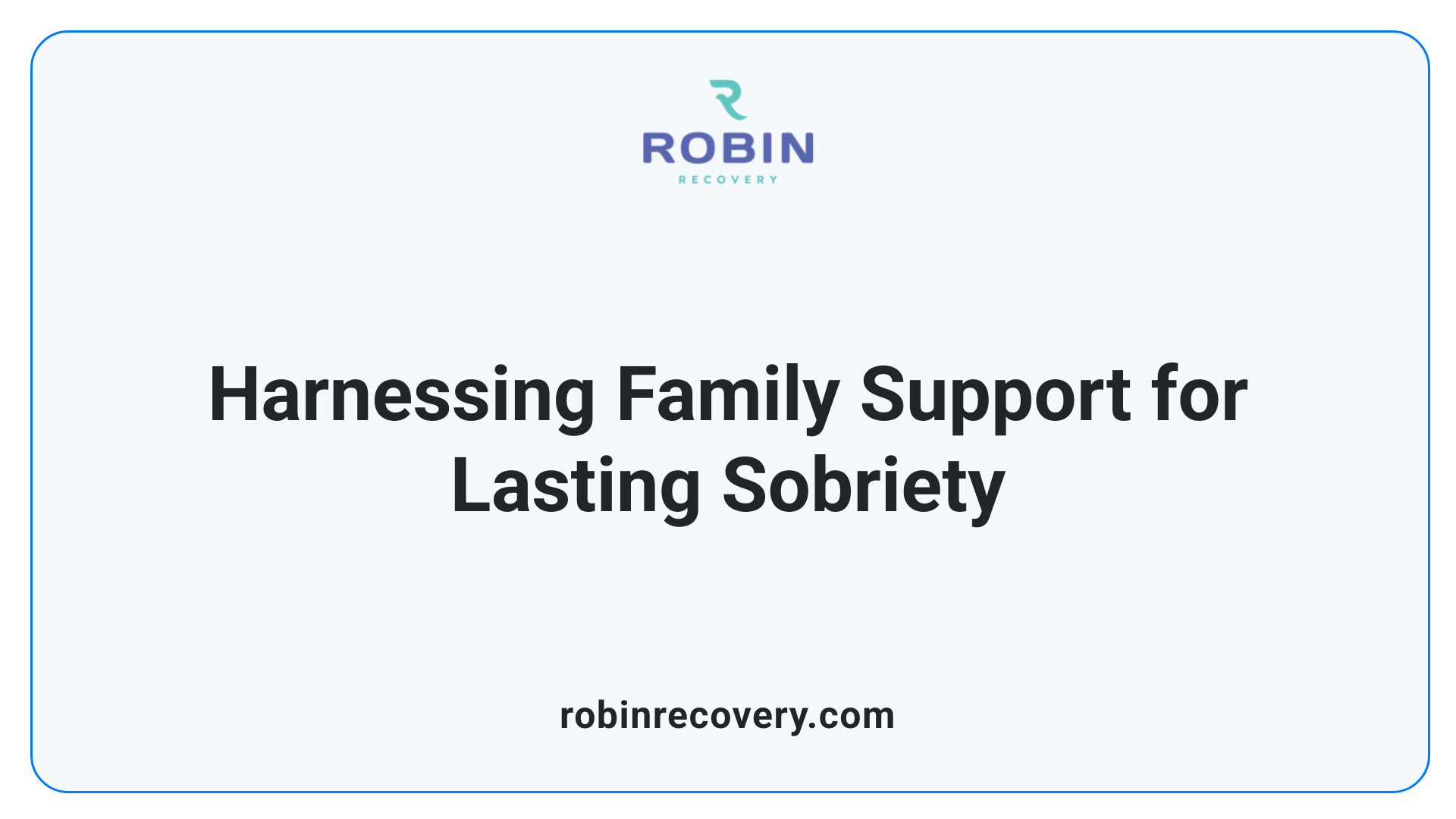The Role of Family in Preventing Relapse and Encouraging Sobriety

Understanding the Family's Influence
Addiction is often referred to as a family disease, intricately affecting not just the individual but also their loved ones. The family unit plays a pivotal role in both the prevention of addiction and the recovery process. Strong family support can make a significant difference in an individual's journey toward sobriety, reducing relapse rates and fostering a nurturing environment conducive to long-term recovery. This narrative explores the various roles family members adopt, their impact on the recovery process, and practical strategies to enhance familial support during addiction treatment.
The Dual Impact of Family Dynamics

What role does family play in addiction recovery?
Family plays a crucial role in addiction recovery, serving as a vital support system. Addiction impacts the entire family unit, creating emotional and financial turmoil. Children, in particular, may face unmet developmental needs and have a heightened risk of developing their own substance use disorders.
Positive family involvement can lead to better treatment outcomes. Research shows that individuals with strong family support are more likely to adhere to treatment and experience fewer hospitalizations. Family dynamics during addiction may include roles such as the enabler, scapegoat, or hero, which can significantly influence the recovery process.
Healthy interactions and involvement in treatment allow family members not only to support their loved one but also to begin healing their own relationships. Open communication, education about addiction, and participation in family therapy foster an understanding environment that can promote recovery and unity.
Prevention Through Family Strengthening

What is the family's role in preventing drug addiction?
Families serve a vital function in the prevention of drug addiction. By creating a supportive and nurturing environment, they can foster healthy relationships and promote open communication. Numerous studies indicate that standardized family-based interventions effectively combat adolescent substance abuse and related behavioral issues.
Through targeted skills training, families can enhance parenting practices that embody protective factors. This training not only strengthens the parent-child bond but also helps in reducing the risk factors associated with substance use. Quality family time is particularly crucial, as it can significantly mitigate risks of substance use while promoting positive development in youth.
Involving families in preventive efforts not only benefits adolescents but also reinforces the unity and health of the entire family unit, illustrating their protective role against drug addiction. Furthermore, improving family dynamics through education and therapy can lead to healthier interactions that instill mutual support and resilience, ultimately fostering an environment that actively deters addiction.
Overcoming Challenges: How Addiction Affects the Family

How does addiction affect family and friends?
Addiction profoundly impacts families, stirring emotional turmoil and disrupting dynamics. Family members often endure feelings of loneliness, guilt, and frustration, which can heighten stress and lead to conflicts. Children in these situations may experience emotional neglect, bear inappropriate adult responsibilities, and face increased risks of developing substance use disorders later in life.
As trust deteriorates, relationships such as marriages often suffer, resulting in communication breakdowns and emotional alienation. This instability can disrupt financial security and social connections, creating a cycle of negative effects.
Coping mechanisms for family members
To navigate the challenges that addiction raises within the family, several coping strategies are beneficial:
- Seeking Support: Families can engage in support groups like Al-Anon for emotional backing and shared experiences.
- Open Communication: Regular and honest discussions can help address feelings, rebuild trust, and foster understanding among family members.
- Setting Boundaries: Developing clear boundaries prevents enabling behaviors and establishes respect within family relationships.
- Participating in Family Therapy: Including family members in treatment encourages unity, helps resolve conflicts, and promotes a supportive environment for recovery.
Recognizing addiction as a family crisis underscores the need for empathy and understanding rather than blame, aiming for collective healing and resilience.
Quick Overview of Family Impacts and Coping Strategies
Family Impact Coping Strategies Emotional turmoil and guilt Seek support through groups like Al-Anon Deteriorated trust and relationships Maintain open communication Increased risk for children Set healthy boundaries Financial instability Engage in family therapy Overall instability and conflict Foster an understanding, empathetic environment
Strategies for Effective Family Support

Role of Family Support in Reducing Relapse
Family support plays an essential role in recovery from substance use disorders (SUD). Individuals surrounded by supportive family members are not only more likely to engage in treatment but also demonstrate better long-term outcomes. This support fosters emotional stability and helps reduce the likelihood of relapse, encouraging individuals to remain committed to their sobriety.
Conversely, dysfunctional family dynamics can perpetuate unhealthy behaviors, making recovery challenging. Families that adopt healthy communication patterns and establish clear boundaries significantly enhance their loved one’s chances of successfully navigating recovery.
Methods to Enhance Family Involvement in Recovery
To strengthen family involvement in the recovery process, consider the following strategies:
- Open Communication: Encourage honest discussions regarding feelings and experiences related to addiction.
- Family Therapy: Participate in therapy sessions to address issues collaboratively, improve understanding, and resolve conflicts.
- Support Groups: Engage in programs like Al-Anon or Nar-Anon to share experiences and learn coping strategies.
- Setting Boundaries: Clearly communicate expectations and boundaries to foster a responsible environment promoting recovery.
- Celebrating Milestones: Recognize and celebrate recovery achievements as a family to build motivation and unity.
By implementing these strategies, families can contribute positively to their loved one's recovery journey.
Family Therapy: A Path to Healing
Benefits of family therapy in addiction recovery
Family therapy is a vital element in the recovery process for individuals with substance use disorders (SUD). It allows families to engage collaboratively in the treatment journey, fostering a supportive environment that encourages sobriety.
Some significant benefits include:
- Enhanced Communication: Family therapy improves dialogue among family members, allowing open discussions about feelings and experiences related to addiction. This strengthens relationships and nurtures emotional support.
- Conflict Resolution: It provides a safe space where unresolved conflicts can be addressed, increasing empathy and understanding for one another's struggles.
- Understanding Addiction: Family members learn about addiction's complexities, which helps them develop healthier dynamics and strategies to support their loved one effectively.
Family therapy techniques and outcomes
Various techniques are implemented in family therapy to foster healing:
- Behavioral Interventions: These reinforce positive behaviors and encourage accountability within the family.
- Psychoeducation: Educating families on the effects of addiction and the recovery process empowers them to provide informed support.
- Coping Strategies: Teaching families to recognize triggers and develop coping mechanisms together promotes a united front against relapse.
Outcomes from family therapy often include reduced relapse rates, improved emotional health, and stronger familial bonds, leading to a supportive and nurturing environment conducive to recovery.
Building a Supportive Family Environment
Creating a Safe and Nurturing Home for Recovery
Establishing a secure and nurturing environment is vital for individuals recovering from substance use disorders. Families play an essential role in creating a substance-free home, minimizing potential relapse triggers. To facilitate this, families can take steps such as removing substances from the home and fostering routines that promote healthy habits. This supportive atmosphere helps individuals feel safe, valued, and motivated during their recovery journey.
Importance of Open Communication and Boundary-Setting
Open communication is the cornerstone of a healthy family dynamic. It allows family members to express their feelings, concerns, and experiences related to addiction, thus creating a stronger support system. Active listening plays a crucial role in establishing trust and understanding among family members.
Additionally, setting healthy boundaries is equally important. Clear boundaries promote respect and prevent enabling behaviors that could undermine recovery efforts. By balancing compassion with firm expectations, families empower their loved ones to take responsibility for their recovery, contributing to more sustainable outcomes.
By focusing on these elements, families can enhance the recovery experience and reduce the chances of relapse.
The Long-Term Benefits of Familial Involvement

Sustaining Long-Term Sobriety Through Family Support
Family support is a cornerstone in achieving long-term sobriety for individuals recovering from substance use disorders (SUD). Research indicates that when families play an active role in the treatment process, individuals are less likely to relapse. This support can manifest in various ways, from attending family therapy sessions to encouraging open communication about challenges and triumphs in recovery.
Impact of Family Involvement on Recovery Success
Empirical studies show that family involvement significantly improves recovery outcomes. Families who engage positively foster environments steeped in accountability and emotional support, which are essential for maintaining sobriety. Moreover, celebrating recovery milestones as a family reinforces encouragement and motivation, reminding the recovering individual that their journey is valued.
Families that embrace healthy communication patterns help address the root causes of addiction, paving the way for healthier dynamics. These connections not only support the individual in their recovery efforts but also contribute to improved overall family relationships, reducing psychological distress within the family unit.
Family InvolvementImpact on RecoveryLong-Term Benefits Active participation in therapy Improved treatment outcomes Increased likelihood of sobriety Open communication Strengthened relationships Reduced emotional turmoil Emotional support Enhanced motivation for recovery Better family dynamics and cohesion
Culminating the Family's Role in Sustained Recovery
In every stage of addiction recovery, the family's participation is not just beneficial—it's critical. As we examine the intricate relationship between family dynamics and recovery, it is clear that both the prevention and treatment of substance use disorders benefit profoundly from involved, understanding, and supportive family members. By embracing healthy communication, setting boundaries, and engaging in therapy, families can transform not just their loved one's lives but create a nurturing environment that promotes sobriety and healing for all members involved. As research continues to underscore, recovery is a shared journey where the family's steadfast role is unmatched in encouraging enduring sobriety and preventing relapse.
References
- The Role Of Family In Addiction Recovery
- Family Involvement in Treatment and Recovery for Substance Use ...
- What Family and Loved Ones Should Know About Relapse
- The Role of Family Support in Addiction Recovery
- The Role of the Family in Alcohol Use Disorder Recovery for Adults
- The Role of Family Support in Addiction Recovery
- The Role of Family in Addiction Recovery - Drug Rehab Utah
- The Importance of Family Support in Addiction Recovery
- Family Support's Impact on Addiction Recovery: Motivation & Strength
